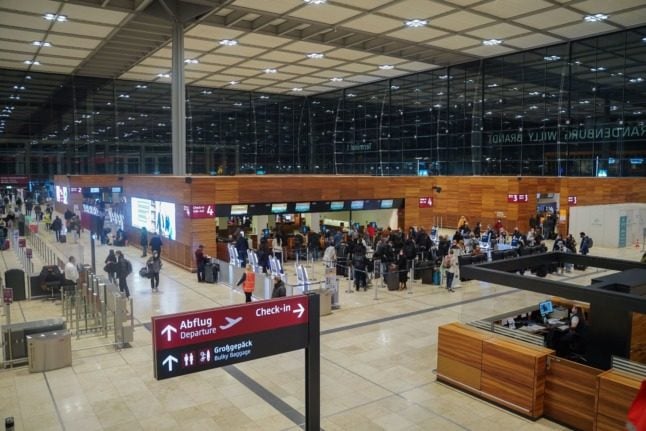The UK will be classified as a ‘virus variant area of concern’ from midnight on Sunday December 19th due to the spread of the Omicron variant of Covid-19.
The move puts in place a temporary ban on almost all travellers arriving from the UK to Germany, except from its own residents.
Travellers who are allowed to enter Germany – such as German nationals and people with residence rights – will have to quarantine for two weeks even if they are fully vaccinated, or have recently recovered from Covid.
They also have to show a negative “up to date” PCR test before departure. Antigen tests are no longer accepted for travellers coming from Germany’s red list.
The move is a blow to those heading home for Christmas, who will now have to cancel their plans or face the much tougher rules.
Germany’s Health Ministry noted in the latest Robert Koch Institute risk list update: “Before departure, please be prepared for your carrier (e.g. airline) to require from you an up-to-date PCR test if you spent time in an area of variants of concern at any time in the ten days prior to entry.
“After your arrival, further PCR testing may be ordered by the health authorities at the airport or at the place of isolation/quarantine. Please be aware of the 14-day quarantine requirement, which also applies to vaccinated and recovered individuals. The duration of the 14-day quarantine may not be shortened.”
The RKI said the regions on the ‘virus variant list’ would remain there until at least January 3rd.
Other countries in Germany’s highest risk category include South Africa, Botswana, Eswatini, Malawi, Mozambique, Namibia and Zimbabwe.
The UK reported over 90,000 new Covid-19 infections on Saturday, setting a record for the third day in a row. This figure included 10,059 new confirmed cases of the Omicron variant.
There are estimated to be hundreds of Omicron cases in Germany, RKI boss Lothar Wieler said at a recent press conference.
READ ALSO: Germany must prepare for massive Omicron wave, says Health Minister
Germany has classified UK as area of variants of concern due to Omicron
Travel rules change from 20 Dec:
➡️ ban on carriage, exceptions e.g. German nationals/residents & transit
➡️ Test pre-departure
➡️ 14-day quarantine, incl vaccinated & recovered— German Embassy London (@GermanEmbassy) December 18, 2021
The ban does not apply to people on flight transfers through Germany who are not leaving the airport.
It comes after state health ministers across Germany called on the federal government to tighten the rules on travellers from the UK.
READ MORE:



 Please whitelist us to continue reading.
Please whitelist us to continue reading.
Absurd decision. Its already established in Germany. Anyway why not include Denmark in this ruling?
Denmark is an EU Member State, and also a Schengen State, while the UK is not. Travelling from the UK to the EU is not a right, but a privilege for British Citizens.
So what? EU treaties allow member states to suspend open borders on a temporary basis if they have a good reason. We saw that in 2020. This decision is political expediency as much as a health concern.
The possibility of re-introducing internal border controls is not mentioned in the “EU treaties”, but in Articles 25 to 35 of the Schengen Borders Code.
In addition, the possibility of re-introducing border controls does not imply what border guards may decide at such controlled border. This is still subject to the additional rules, and differences are to be made between Union citizens and others.
The possibility to restrict free movement of EU citizens for public health reasons (under strict conditions) is contained in Article 6 of Directive 2004/38/EC. However, different to the time at the start of the pandemic, EU states now coordinate and substantiate such legal provisions, e.g. by Recommendation (EU) 2020/912, as amended. The goal is to keep internal borders open as far as possible, and to restrict free movement of EU citizens as reluctantly as possible.
The United Kingdom is not an EU Member State, and their citizens are not Union Citizens (cf. Article 20 TFEU) any more. The border to the United Kingdom is an external border. All considerations pertaining to internal borders and Union citizens do not apply to the United Kingdom and its citizens. The mere fact that United Kingdom citizens mostly do not require a visa to enter Schengen States does not mean that they have any right to enter, unless admitted.
This is why I said that travelling to the EU is a privilege, and not a right, of British Citizens. This is surely politically determined – by the United Kingdom, which had decided to leave the European Union.
Where is that information from that the PCR test should be no more than 48 hours old? Federal Foreign Office says 72
Hi there, that was the previous rule for ‘virus variant areas’ but we are double checking this. Thank you for flagging up.
So what? EU treaties allow member states to suspend open borders on a temporary basis if they have a good reason. We saw that in 2020. Its political isn’t and not entirely health based. Anyway,